Open Seminars 2022
Session 6: 06/05/2022 – 10:00 am CEST [Link here]
Slow Violence and Vulnerability: Exploring Connections in Literary Analysis
Texts to be discussed:
- Cole, Alyson. 2016. “All of Us Are Vulnerable, But Some Are More Vulnerable than Others: The Political Ambiguity of Vulnerability Studies, an Ambivalent Critique.”Critical Horizons 17, no. 2: 260-277.
- Nixon, Rob. 2011. Slow Violence and the Environmentalism of the Poor. USA: Harvard UP.
In this session, Susana Nicolás Román (University of Almería) will comment a summary of two key theoretical texts for 20-25 minutes and then a debate with participants will follow to discuss these ideas. The two texts under scrutiny are Alyson Cole’s “All of Us Are Vulnerable, But Some Are More Vulnerable than Others: The Political Ambiguity of Vulnerability Studies, an Ambivalent Critique” (2016) and Rob Nixon’s Slow Violence and the Environmentalism of the Poor (2011). This online seminar aims to enquire the very concept of vulnerability and slow violence and their exploratory connections in Literary Criticism due to their common questioning of social structures in the neoliberal era.
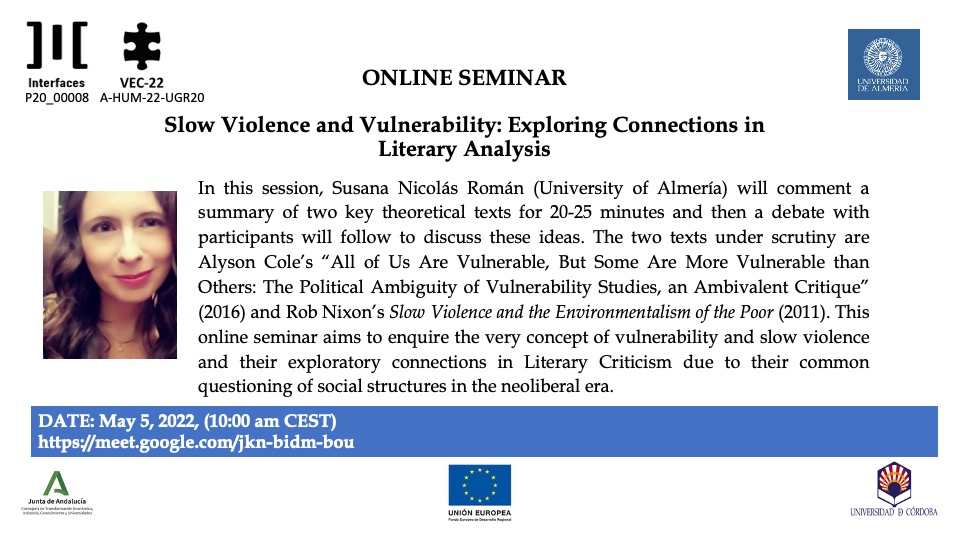
Session 5: 20/04/2022 – 10:30 am CEST [Link here]
Beyond Mortalist Humanism: Death, Mourning and Citizenship
Texts to be discussed:
- Mbembe, Achille, 2003. “Necropolitics”. Public Culture, vol. 15, no. 1, pp. 11-40.
- Honig, Bonnie, 2011. “The other is dead: mourning, justice, and the politics of burial”. Theorizing Post-Conflict Reconciliation.
For this session Carolina Sánchez-Palencia (University of Seville) has chosen two texts that illuminate the operations of power aimed at both exposing individuals to death and conditioning their affective memorialization. In “Necropolitics” (2003) Achille Mbembe expands Foucault’s notion of biopolitics so as to account for the contemporary ways in which the political (in its different expressions) makes the murder of its enemy its primary goal. Bonnie Honig argues in “The other is dead: mourning, justice, and the politics of burial” (2011), that after-death circumstances are also shaped by necropower in the form of differential and hierarchical rights to mourn, grieve or memorialize the dead.
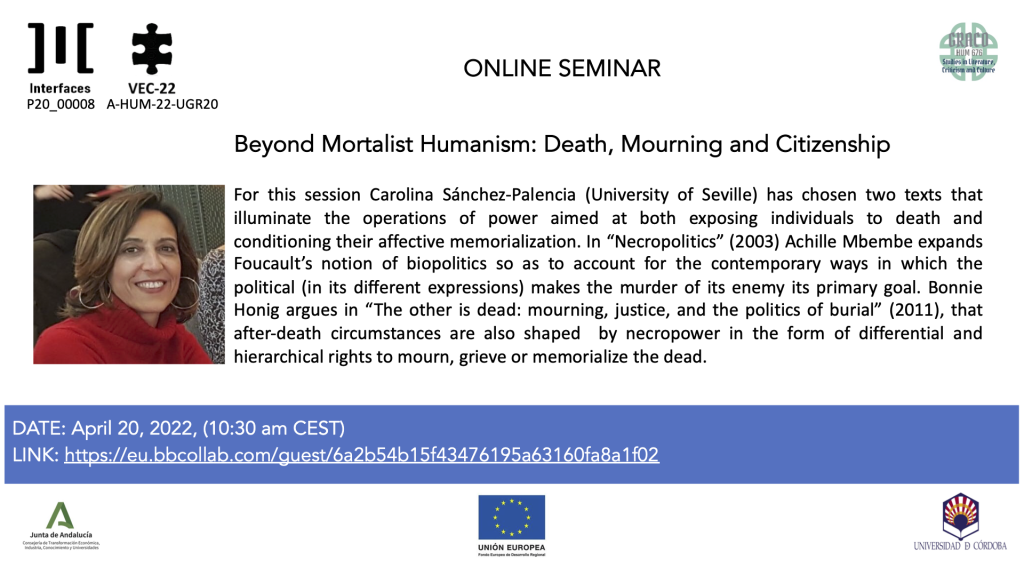
Session 4: 09/03/2022 – 10:30 am CEST [Link here]
Vulnerability and Its Virtual Turn in Cultural Studies
Texts to be discussed:
- Ganteau,Jean-Michel, 2015. “Introduction”. The Ethics and Aesthetics of Vulnerability in Contemporary British Fiction.
- Han, Byung-Chul, 2021. No-Cosas: Quiebras del mundo de hoy.
In this ninety-minute session, Javier Martín Párraga (University of Córdoba) will comment a summary of two key theoretical texts for 20-25 minutes and then a debate with participants will follow to discuss these ideas. The two texts under scrutiny are Jean-Michel Ganteau’s “Introduction” to The Ethics and Aesthetics of Vulnerability in Contemporary British Fiction (2015) and Byung-Chul Han’s No-Cosas: Quiebras del mundo de hoy (2021). This online seminar aims to enquire the very concept of vulnerability, how it has evolved and its connections to Literary Criticism and its effects on the Fourth Industrial Revolution.
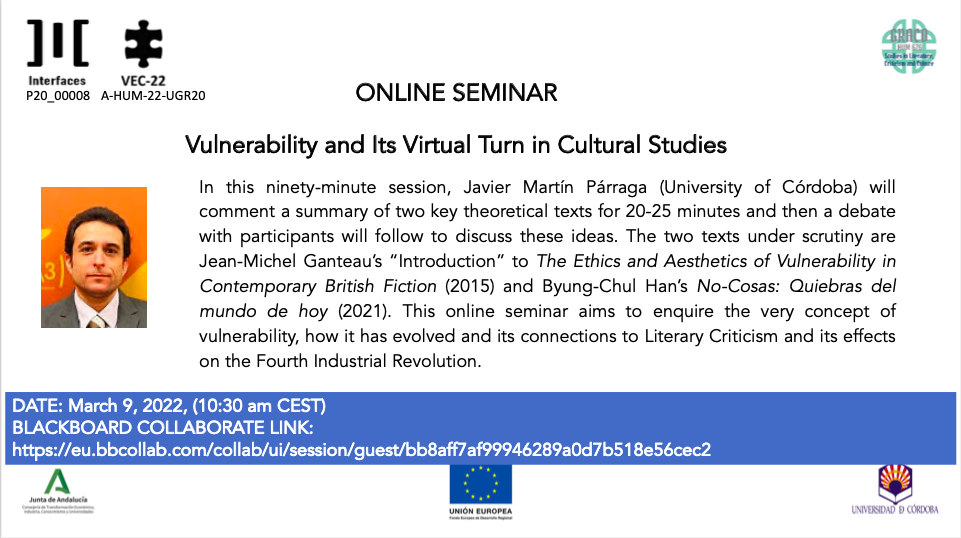
Session 3: 02/02/2022 – 10:00 am CEST [Link here]
Transcendentalism and liminality: Machine-‐like, organic, physical and virtual humans
Texts to be discussed:
- Schwab, Klaus. 2016. “Impact” and “The Way Forward.” The Fourth Industrial Revolution. pp. 86-‐105.
- Kurzweil, Ray. 2005. “The Six Epochs.” The Singularity is Near: When Humans Transcend Biology, pp. 24-‐43.
In this one-hour session, Ana Chapman (University of Málaga) two essential theoretical texts about the 4IR will be introduced to give way to a discussion on the major consequences and views presented in them. The two texts for this seminar are Schwab’s The Fourth Industrial Revolution (2016) and Ray Kurzweil’s The Singularity Is Near (2005). The objective of this seminar is to set ground for understanding of the historical and economic framework of the 4IR while also observing an underlying transhumanistic view of technology development and human enhancement in Kurzweil’s Singularity concept.
The goal of this session is to discern a historical and economic framework of the 4th Industrial Revolution through Schwab’s text to then present Kurzweil’s concept of Singularity. Both works present the exponential speed in which technology applications need to be scrutinized. Schwab inspects the role of public and private institutions to inform and prepare citizens while Kurzweil presents a historical division and analysis to predict a profound informational change between human and nonhuman intelligence. I will be reflecting on the possible transcendental changes the rapid growth of technological innovation may have through the exploration of both texts and with possible hints of transhumanist futuring.
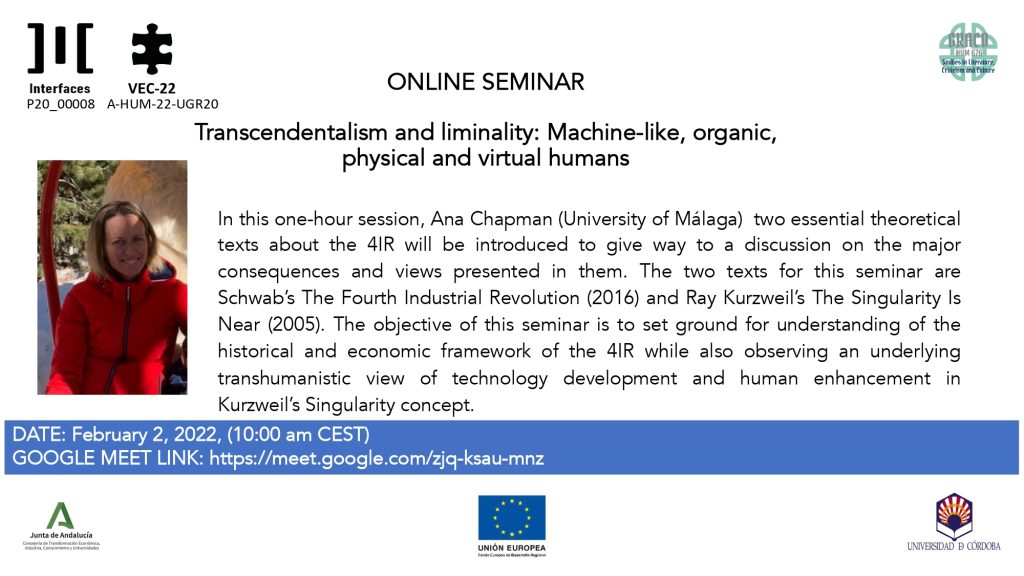
Session 2: 26/01/2022 – 10:00 am CEST [Link here]
The Ethical and Political Imperative and its Practical Implications in Literary and Cultural Analysis
Texts to be discussed:
- Butler, Judith. 2020. “Introduction.” In The Force of Nonviolence. An Ethico-Political Bind, pp. 1-26.London & New York: Verso.
- Levinas, Immanuel. 1969. “Ethics and the Face.” In Totality and Infinity. An Essay on Exteriority, pp. 194-219. Pittsburgh: Duquesne University Press.
In this one-hour session, Cristina M. Gámez-Fernández (University of Córdoba) will comment a summary of two key theoretical texts for 20-25 minutes and then a debate with participants will follow to discuss these ideas. The two texts under scrutiny are Judith Butler’s “Introduction” to The Force of Non-Violence (2020) and Immanuel Levinas’s “Ethics and the Face” in Totality and Infinite (1969). This online seminar aims to enquire the nature and philosophical roots of Judith Butler’s conceptualization of precarity (2004; 2009) and its implications in literary and cultural analysis.The first text builds on her earlier theorization of precarity at the beginning of the millennium to expand into the discussion of violence and nonviolence, the conditions in which they are used, and their political and social implications—how, why, and by whom these are used—; whereas the second text contains the philosophical frame that Butler employed to develop her notion of precarity and the ethical demand it imposes on us as members of society.
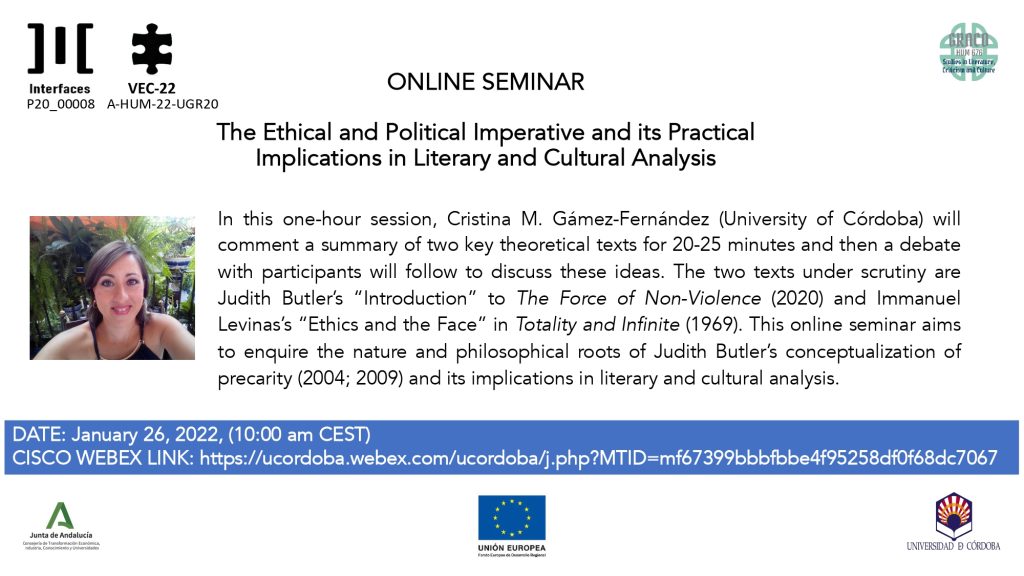
Session 1: 23/11/2021 – 10:00 am CEST [Link here]
Texts to be discussed:
- Han, Byung-Chul. The Transparency Society. Stanford: Stanford University Press, 2015.
- Johannessen, Jon-Arild. The Workplace of the Future. The Fourth Industrial Revolution, The Precariat and the Death of Hierarchies. London & New York: Routledge, 2019.
For this session, Miriam Fernández-Santiago (University of Granada) chose two texts that challenge both the transhumanist and critical posthumanist
visions of the 4th IR that we have been analyzing so far. Both visions align with the European tradition of the political left, but they approach the subject from different perspectives: the philosophical (Han) and the socioeconomic (Johanessen).
